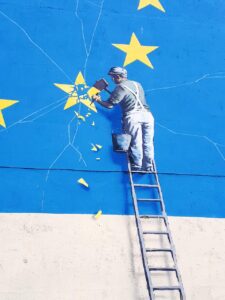- Politics
- EU Challenges
- By Manohar Patil
Navigating the Storm: Key Challenges Facing the European Union Today
The European Union, a unique political and economic bloc of 27 member states, is a testament to post-war cooperation and integration. However, in recent years, the EU has found itself grappling with a multifaceted array of internal and external pressures. From economic disparities and geopolitical shifts to migration debates and the rise of populism, the EU challenges of the present day are testing its unity and resilience like never before. Understanding these complex issues is vital to appreciating the path ahead for this influential global actor.
Economic Headwinds and Disparities
While the EU boasts a vast single market, significant economic disparities persist among its member states. The lingering effects of past financial crises, coupled with varied national economic performances, contribute to a two-speed Europe. High energy costs, less success in the digital technology arena compared to global competitors like the US and China, and often higher taxes and tighter regulation contribute to slower growth. Addressing these issues requires substantial investment in digitalization and decarbonization, alongside efforts to reduce bureaucratic burdens and foster innovation. The goal is to ensure a more equitable distribution of prosperity and maintain the EU’s global economic competitiveness.
Geopolitical Instability and Security Concerns
The Russian aggression against Ukraine has fundamentally reshaped the EU’s security landscape. The conflict has not only spurred a renewed focus on defense capabilities and energy security but also highlighted the need for a more coherent and robust common foreign policy. The EU faces the delicate balance of supporting Ukraine while navigating potential geopolitical fallout, including the risk of renewed Russian aggression in neighboring non-NATO states. Furthermore, uncertainties regarding future transatlantic relations, particularly with a potential shift in US foreign policy, underscore the imperative for the EU to enhance its strategic autonomy and strengthen its own defense mechanisms. Hybrid and cyber threats also pose a significant and growing risk to critical infrastructure across the bloc.
Migration and Social Cohesion
The issue of migration continues to be a contentious EU challenge. The 2015 refugee crisis exposed deep rifts among member states, and the lack of a unified, comprehensive approach to asylum and border management remains a persistent source of tension. While the EU has made efforts to strengthen external border controls and address root causes of migration, debates surrounding solidarity, responsibility-sharing, and integration continue. This complex issue is often exploited by populist movements, contributing to social tensions and impacting the perception of trust in institutions. Finding a sustainable and humane solution that balances national sovereignty with shared European values is crucial for maintaining social cohesion.
Democratic Backsliding and the Rule of Law
Internally, the EU faces challenges to democratic values and the rule of law in certain member states. Concerns over judicial independence, media freedom, and civil society space have led to disputes between some national governments and Brussels. The EU employs various instruments, including infringement procedures and conditionality mechanisms tied to funding, to address these issues. However, the rise of Eurosceptic and nationalist parties, often challenging core democratic principles, underscores the need for continuous vigilance and reinforcement of the EU’s foundational values. Upholding the rule of law is not merely a legal matter but is fundamental to the legitimacy and functioning of the entire Union.
In conclusion, the European Union is confronting a complex interplay of economic, geopolitical, social, and political EU challenges. While the bloc has demonstrated resilience in overcoming past crises, the current environment demands strategic foresight, unified action, and a commitment to its founding principles. How the EU navigates these turbulent waters will not only determine its own future but also significantly influence the global balance of power and the trajectory of international cooperation.
Share this Article
WhatsApp
LinkedIn
Telegram
Email
Get Daily Updates to Your Inbox
Subscribe to News Letter
Advertisement


